What Is Organic Search in Google Analytics?
When you log into your Google Analytics account, you might see some terms you don’t know. The platform offers data on numerous metrics, and their meaning might not be clear if you’re new to Google Analytics or digital marketing in general.
One such term is organic search. It’s got nothing to do with pesticide-free foods but rather refers to one of the most prominent ways people find information online — search engines.
Keep reading to learn more about what organic search is, why it’s important, how to find organic search data in Google Analytics, and how to increase your organic traffic.
Want more digital marketing tips and tricks delivered to your inbox? Sign up for one of our email newsletters!
Our library of free guides can help youLearn digital marketing insights from the WebFX experts
plan your next digital marketing strategy.
What is organic search in Google Analytics?
Organic search is a source of traffic in Google Analytics — one of the ways users get to your website.
The term refers to unpaid listings on search engine results pages (SERPs), called organic search results.
It doesn’t include paid results on SERPs, such as text ads and Google Shopping ads. You can’t pay for an organic listing. Google and other search engines rank these results according to their quality, relevance to the search query, and other factors.
In the image below, you’ll see an example of what organic search results and paid search results look like on a Google SERP.
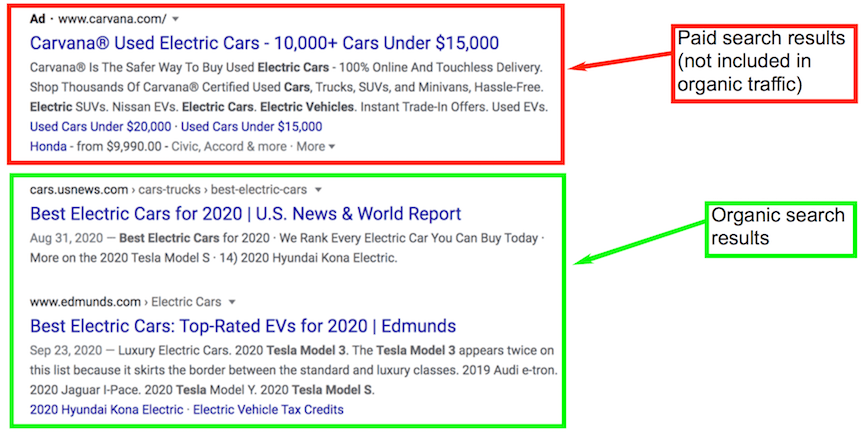
Google is the most popular search engine, but it isn’t the only search engine Google Analytics considers a source of organic traffic
Google Analytics tracks organic search traffic from a list of search engines that includes:
- Bing
- Yahoo
- Baidu
- DuckDuckGo
You can add and remove search engines from the list used for each property in your Google Analytics account in your Admin settings.
Other traffic sources of traffic in Google Analytics
While we’re focusing on organic traffic in this post, it’s helpful to know a little about the other traffic sources in Google Analytics for comparison. Other traffic sources include:
- Paid search: Traffic from paid ads on SERPs
- Direct: Traffic from an unknown source, including users typing your website’s URL directly into their browser
- Referral: Traffic from links to your website on other websites
- Social: Traffic from social media platforms
- Display: Traffic from display ads, such as banner ads
- Email: Traffic from links in marketing emails
How to find organic search data in Google Analytics
So, how do you check your organic search data in Google Analytics?
When you log into your Google Analytics account and select your desired property and view, you’ll see some basic information about your traffic sources on your home page. You’ll find this data in a graph under the heading ‘How do you acquire users?’
You can dig deeper into this data by clicking on ‘Acquisition Report’ at the bottom right corner of the graph.
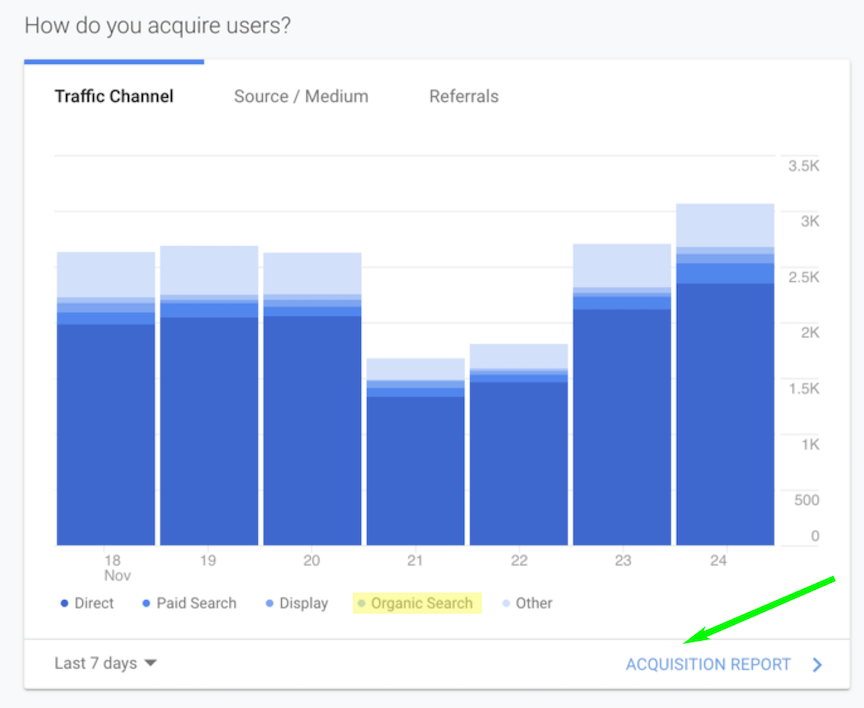
Another way to get to this acquisition report is to go to ‘Acquisition’ and then ‘Overview’ in the left-hand menu. This Acquisition Overview report provides you with data about where your traffic comes from, including your top channels.
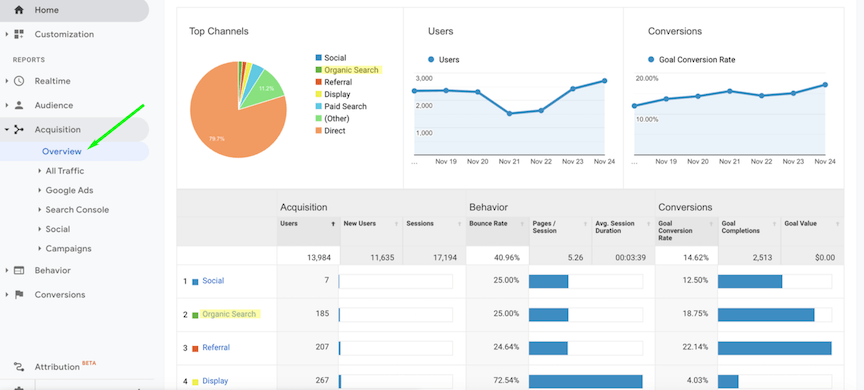
For more details on your organic search traffic, click ‘Campaigns’ under the ‘Acquisition’ tab. Then, select ‘Organic Keywords.’
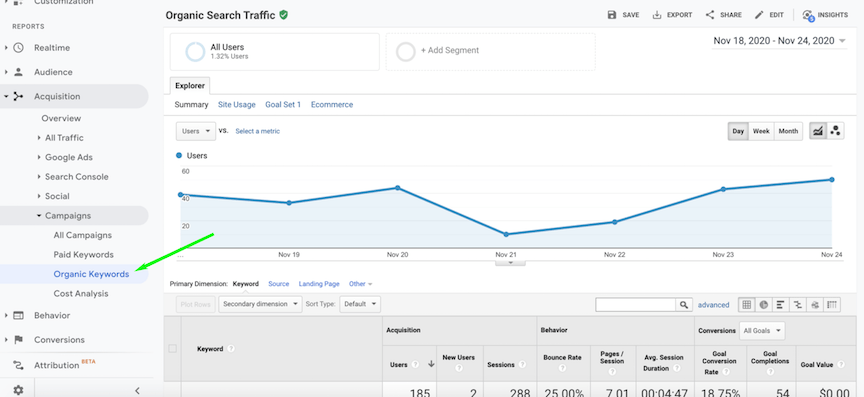
In the chart at the bottom of the organic keywords page, you can see the top organic keywords that brought traffic to your site.
If you change the ‘Primary Dimension,’ you can also see the search engines that sent the most traffic to your site, the pages search engine users most often landed on, and more.
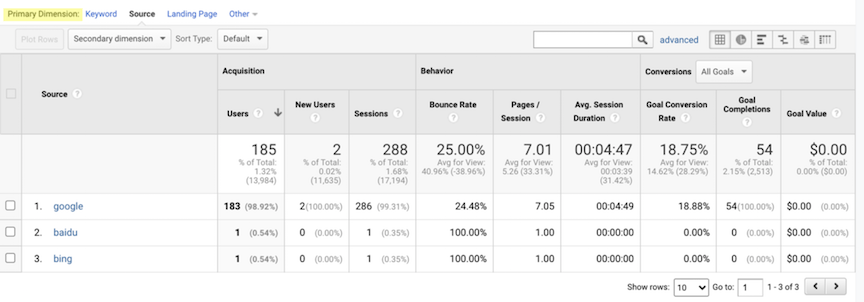
Another helpful feature is the ability to change the dates for the data in the report. You can do this in the top-right corner of the screen.
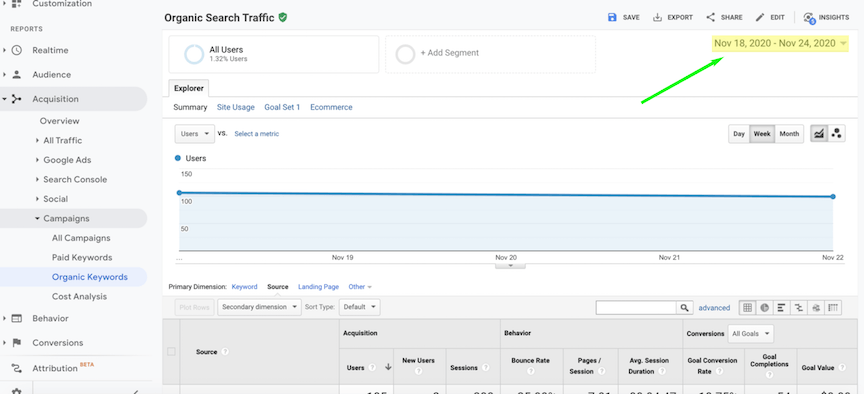
The importance of organic search traffic
Organic search plays a fundamental role in digital and inbound marketing. Checking on your organic search traffic in Google Analytics and learning how to grow it is valuable for today’s businesses and websites.
Here are some of the reasons organic search traffic is so valuable.
1. Your customers use search engines
Search engines are one of the most popular ways to find information online. In fact, organic search drives more than half of all website traffic.
2. Your competitors are optimizing for search
Even if you don’t have much of a presence on search engines, it’s likely that some of your competitors do. If your competitors rank above you in search results, you’re missing out on traffic.
You’re likely losing out on traffic even if you rank on the second or third page for relevant keywords. Three-quarters of search engine users don’t go past the first page of results, so it’s essential to optimize your site to improve your rankings.
3. Organic traffic is highly qualified
The traffic you get from organic search is typically highly qualified, meaning your website visitors are genuinely interested in your content, brand, or products and services.
If someone clicks on an organic search result, they’re actively searching for information or a service they believe your business provides.
4. Organic search rankings increase your credibility
Ranking well in search results can cause users to view your site as more credible. While anyone can pay to appear in paid search results, you have to earn organic search results by creating high-quality content.
5. Earning organic search traffic is cost-effective
You don’t have to pay to appear in organic search results, which makes focusing on organic traffic a cost-effective approach to digital marketing.
While you’ll need to spend time optimizing your site and possibly invest in search engine optimization (SEO) services, investments in SEO bring results over the long term.
Unlike ads, which only bring in traffic while you’re paying for ad space, optimized pages can continue driving organic traffic long after you first create them.
Over 150 WebFX clients have been interviewed by Clutch to discuss their experience partnering with us.Independent research from Clutch has named WebFX the top SEO company in the United States.
How to increase organic search traffic
So, how do you go about earning more organic search traffic? The answer is search engine optimization, or SEO.
SEO encompasses a wide range of strategies and involves optimizing your website to help it rank in search engines for relevant keywords and bring more qualified organic traffic to your site.
Some of the most important techniques used in SEO include:
Keywords
To increase your qualified organic traffic, you’ll need to conduct keyword research to determine which terms your target audience is searching. Then, you can create content about these topics and include your keywords naturally and strategically throughout your content.
Backlinks
Another important SEO factor is backlinks — links from other sites to yours. Earning more links from reputable websites causes Google to view your website as more reputable and can increase your rankings.
You can earn more backlinks by reaching out to bloggers and other publishers to ask for links, creating high-quality content that people want to link to, and with other tactics.
Page speed
Users expect your site to load quickly. If it doesn’t, they may not wait for it. Google also considers page speed when ranking search results.
You can check your page speed using Google’s free PageSpeed Insights tool, which will rate your page speed and provide recommendations for improving it.
These three factors just scratch the surface of the various SEO methods that can improve your search engine rankings. You can do research and make some SEO improvements yourself, but to maximize your results, consider working with a professional SEO agency.
WebFX SEO Checker


Start growing your organic search traffic
WebFX has more than 25 years of digital marketing experience and has been named the world’s best SEO agency by Clutch. We can create a custom SEO strategy for your business and provide a full suite of SEO services to help your site bring in more qualified organic traffic.
Request a free quote or call us at 888-601-5359 to speak with a strategist!